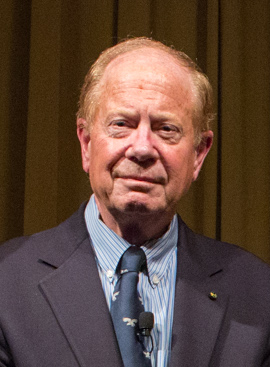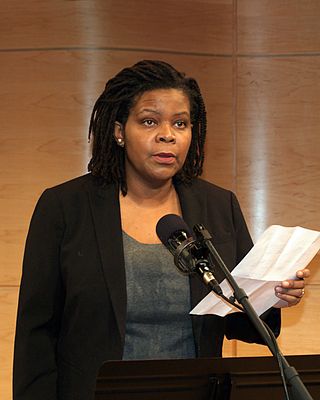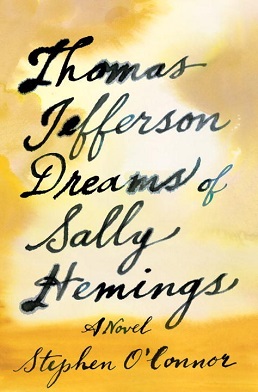Sarah "Sally" Hemings was a female enslaved person with one-quarter African ancestry who was owned by president of the United States Thomas Jefferson, one of many he inherited from his father-in-law, John Wayles.

Joseph John-Michael Ellis III is an American historian whose work focuses on the lives and times of the Founding Fathers of the United States. His book American Sphinx: The Character of Thomas Jefferson won a National Book Award in 1997 and Founding Brothers: The Revolutionary Generation won the 2001 Pulitzer Prize for History. Both books were bestsellers.

Fawn McKay Brodie was an American biographer and one of the first female professors of history at UCLA, who is best known for Thomas Jefferson: An Intimate History (1974), a work of psychobiography, and No Man Knows My History (1945), an early biography of Joseph Smith, the founder of the Latter Day Saint movement.
Randolph Jefferson was the younger brother of Thomas Jefferson, the only male sibling to survive infancy. He was a planter and owner of the Snowden plantation that he inherited from his father. He served the local militia for about ten years, making captain of the local militia in 1794. He also served during the Revolutionary War.
Eston Hemings Jefferson was born into slavery at Monticello, the youngest son of Sally Hemings, a mixed-race enslaved woman. Most historians who have considered the question believe that his father was Thomas Jefferson, the third president of the United States. Evidence from a 1998 DNA test showed that a descendant of Eston matched the Jefferson male line, and historical evidence also supports the conclusion that Thomas Jefferson was probably Eston's father. Many historians believe that Jefferson and Sally Hemings had six children together, four of whom survived to adulthood. Other historians disagree.
The Jefferson–Hemings controversy is a historical debate over whether there was a sexual relationship between the widowed U.S. President Thomas Jefferson and his slave and sister-in-law, Sally Hemings, and whether he fathered some or all of her six recorded children. For more than 150 years, most historians denied rumors that he had a slave concubine, Sally Hemings. Based on his grandson's report, they said that one of his nephews had been the father of Hemings's children. In the 21st century, most historians agree that Jefferson was the father of one or more of Sally's children.

Thomas Jefferson is a 1997 two-part American documentary film directed and produced by Ken Burns. It covers the life and times of Thomas Jefferson, the 3rd President of the United States.

Madison Hemings was the son of Sally Hemings and Thomas Jefferson. He was the third of Sally Hemings’ four children to survive to adulthood. Born into slavery, according to partus sequitur ventrem, Hemings grew up on Jefferson's Monticello plantation, where his mother was also enslaved. After some light duties as a young boy, Hemings became a carpenter and fine woodwork apprentice at around age 14 and worked in the joiner's shop until he was about 21. He learned to play the violin and was able to earn money by growing cabbages. Jefferson died in 1826, after which Sally Hemings was "given her time" by Jefferson's surviving daughter Martha Jefferson Randolph.

The Monticello Association is a non-profit organization founded in 1913 to care for, preserve, and continue the use of the family graveyard at Monticello, the primary plantation of Thomas Jefferson, the third President of the United States. The organization's members are lineal descendants of Thomas Jefferson and his wife Martha Wayles Skelton Jefferson. The site is located just outside Charlottesville, Virginia. Thomas Jefferson was the designer, builder, owner, and, with his family, a first resident of Monticello.

Thomas Jefferson Randolph of Albemarle County was a Virginia planter, soldier and politician who served multiple terms in the Virginia House of Delegates, as rector of the University of Virginia, and as a colonel in the Confederate Army during the American Civil War. The favorite grandson of President Thomas Jefferson, he helped manage Monticello near the end of his grandfather's life and was executor of his estate, and later also served in the Virginia Constitutional Convention of 1850 and at the Virginia Secession Convention of 1861.

John Wayles Jefferson, was an American businessman and Union Army officer in the American Civil War. He is believed to be a grandson of Thomas Jefferson; his paternal grandmother is Sarah (Sally) Hemings, Thomas Jefferson's mixed-race slave and half-sister to his wife.
Elizabeth Hemings was a female slave of mixed-ethnicity in colonial Virginia. With her owner, planter John Wayles, she had six children, including Sally Hemings. These children were three-quarters white, and, following the condition of their mother, they were considered slaves from birth; they were half-siblings to Wayles's daughter, Martha Jefferson. After Wayles died, the Hemings family and some 120 other slaves were inherited, along with 11,000 acres and £4,000 debt, as part of his estate by his daughter Martha and her husband Thomas Jefferson.
Walter Beverly Pearson was an American inventor, industrialist and president of the Standard Screw Company. It became known as Stanadyne Automotive Corporation.

The Hemingses of Monticello: An American Family is a 2008 book by American historian Annette Gordon-Reed. It recounts the history of four generations of the African-American Hemings family, from their African and Virginia origins until the 1826 death of Thomas Jefferson, their master and the father of Sally Hemings' children.

Annette Gordon-Reed is an American historian and law professor. She is currently the Carl M. Loeb University Professor at Harvard University and a professor of history in the university's Faculty of Arts & Sciences. She is formerly the Charles Warren Professor of American Legal History at Harvard University and the Carol K. Pforzheimer Professor at the Radcliffe Institute for Advanced Study. Gordon-Reed is noted for changing scholarship on Thomas Jefferson regarding his relationship with Sally Hemings and her children.
Harriet Hemings was born into slavery at Monticello, the home of Thomas Jefferson, third President of the United States, in the first year of his presidency. Most historians believe her father was Jefferson, who is now believed to have fathered, with his slave Sally Hemings, four children who survived to adulthood.
Israel Jefferson, known as Israel Gillette before 1844, was born a slave at Monticello, the plantation estate of Thomas Jefferson, third President of the United States. He worked as a domestic servant close to Jefferson for years, and also rode with his brothers as a postilion for the landau carriage.
Burwell Colbert, also known as Burrell Colbert, was an enslaved African American at Monticello, the plantation estate of the third President of the United States, Thomas Jefferson. There he served an important role in the day-to-day operation and maintenance of the Jefferson estates, including Poplar Forest, as butler, personal valet, glazier, and painter. He was the son of Betty “Bett” Brown, the second child of Elizabeth “Betty” Hemings, the matriarch of the Hemings family in the United States. He was held in high esteem by President Jefferson as a "faithful servant" who was "absolutely excepted from the whip." When Jefferson died on the night of July 4, 1826, Colbert was counted among those at the bedside of the former president.
Sally Hemings has been represented in the media in popular culture due to her relationship with American Founding Father and president Thomas Jefferson. She has been portrayed in films and the inspiration for novels, plays and music.

Thomas Jefferson Dreams of Sally Hemings is a 2016 historical fiction novel by American writer Stephen O'Connor. The novel depicts the relationship between Thomas Jefferson, third President of the United States, and Sally Hemings, his slave and sister-in-law. The depiction, which portrayed the relationship as consensual and romantic, was the focus of controversy due to questions about Hemings's status as a slave and her age difference with Jefferson.










